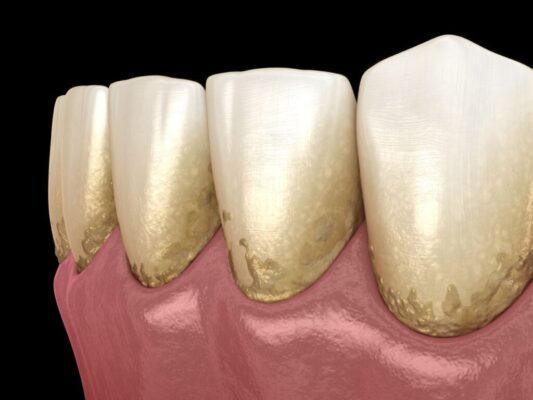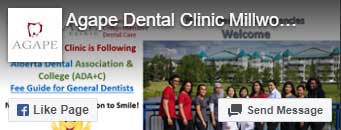
We all know the importance of keeping our teeth, gums, and yes, even our tongues, clean. When our smiles are free of debris, there is less risk of infection and cavities. Plaque, in particular, is a substance that can be tricky to fully remove through brushing at home. Regular cleanings with a professional dentist in Millwoods are recommended to ensure plaque does not develop into tartar and contribute to gum disease.
Plaque: What is It?
Dental plaque is a sticky-like film that forms on your teeth when food particles, salvia, and bacteria amalgamate. More specifically, during mealtimes, the bacteria in your mouth will feed on the sugars and starches in the food, breaking it down until a colourless film is made. That said, plaque can contribute to tooth discoloration since additional food debris can end up sticking to the plaque on your teeth. You can tell when plaque has formed because your teeth will feel almost fuzzy.
Common foods that can lead to plaque formation include:
- Milk
- Juices
- Soda
- Bread
- Pasta
If plaque is not cleaned from your smile frequently, it will eventually harden into tartar (also known as calculus). Tartar cannot be removed at home; you must visit a dentist near you to address this issue. Extensive tartar buildup may lead to cavities, gingivitis or advanced gum disease, dental abscesses (sac of pus), and even tooth loss in extreme cases.
Unlike plaque, tartar is somewhat yellow in appearance. However, when tartar sits on teeth for a period, it can also contribute to staining.
Furthermore, plaque and tartar contribute to chronic bad breath (halitosis). This is another reason why receiving dental cleanings near you is essential – not only are the health of teeth and gums preserved, but your smile is brightened, and your breath improved.
How Can You Treat Plaque Buildup?
A dental hygienist near you can tend to your smile and effectively eliminate the plaque during an in-office appointment. First, they will closely examine your smile to identify where the plaque is – it can form on the surface of your teeth, between teeth, or along your gum line. A comprehensive cleaning will follow. A tool known as a scaler is used to etch the plaque off your smile. You may hear a faint scraping sound, but this won’t hurt. Your tissues may also bleed a little if there is a lot of plaque near the gums. Your dentist will work carefully to ensure all the plaque is cleared away.
Patients with extensive plaque buildup may need root planing. This is a deep dental cleaning that includes tartar removal. Local anesthesia can be administered to prevent discomfort and sensitivity.
In addition to cleanings, your hygienist may recommend other forms of care, such as:
- Fluoride is a mineral found in water and various foods. It encourages your teeth to absorb other minerals, like calcium and phosphate, that keep teeth strong. Remineralization also prevents cavities, which can arise due to plaque and tartar buildup, and preserves your enamel.
During the dental checkup that follows, your dentist will assess the extent of plaque buildup and its impact on your teeth and gums and may recommend treatment to protect your teeth. This may include:
- A dental sealant is a thin coating that’s spread on the top surfaces of your teeth, namely the premolars and molars. The coating prevents bacteria from gathering in the grooves, reducing the risk of plaque and tartar buildup, cavities, and infections. Sealants are typically provided to children, but adults can acquire them, too.
Alongside routine dental visits, there are also steps you can take at home that will help prevent plaque from forming. This includes the following:
- Teeth Brushing. For many of us, brushing after each meal isn’t always possible due to work and school schedules. So, a good rule of thumb is brushing twice a day, once in the morning and once at night. Brush for two minutes and use fluoride toothpaste; harmful debris will be scrubbed away, and your breath will stay fresh.
- Flossing enables you to reach spaces that a toothbrush’s large bristles cannot. Multiple studies have shown that flossing before brushing instead of after helps eliminate more plaque.
- Use Mouthwash. Incorporating mouthwash into your dental hygiene regimen is an additional step to keep your mouth fresh and wash away unhealthy particles that can lead to plaque formation. Fluoride or antiseptic mouthwash is recommended.
- Chew Gum. More specifically, chew sugarless gum. This is a good tactic if you can’t brush your teeth right away. Oral bacteria won’t be able to feed off the gum since there is no sugar Chewing gum gets rid of debris until you get home and can brush and floss properly. It also stimulates saliva, which also keeps your smile clean.
- Eat Healthy. It’s okay to treat yourself now and again, but cutting back on candies, for example, in favour of healthier, crunchy options like yogurt, vegetables, and fruit will preserve your teeth and bones.
Have Questions? We Can Help!
Undergoing routine dental cleanings in Millwoods and being mindful of your own habits at home will set you on a path to achieving and preserving your smile.
At Agape Dental Clinic, our team is here to guide you on your dental journey. Let us know if you have questions or concerns about treatment options and hygiene techniques. Call us today to book a consultation with our dentist.

